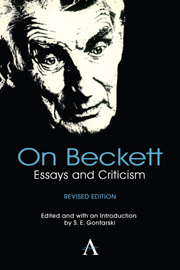Crritics and Crriticism: “Getting Known”
Published online by Cambridge University Press: 05 May 2013
Summary
Vladimir: Sewer-rat!
Estragon: Curate!
>Vladimir: Cretin!
Estragon (with finality): Crritic!
On 13 April 1986 Samuel Barclay Beckett marked his eightieth birthday, an event commemorated by international festivals, performances, and publications unprecedented in an author's lifetime. Such attention was neither sought nor particularly welcomed by Beckett, but it is fully the measure of his impact on the literature and culture of the latter half of the twentieth century—on that period now regularly called postmodern. With his eye on an academic career, Beckett began publishing in the twilight of the twenties with a pair of essays finally more polemical than critical—a defense of James Joyce's Finnegans Wake with its quirky, temporal punctuation, “Dante …Bruno. Vico .. Joyce” (1929), and the commissioned monograph Proust(1931)—and a long, arcane poem, Whoroscope(1930), written within and simultaneously beyond the modernist tradition of The Waste Landand Hugh Selwyn Mauberley.
However, Beckett's work garnered little critical attention until the trilogy began to appear just after mid-century. By then Beckett had completed an additional six prose works (three in English and the French trilogy), a volume of poems, Echo's Bones and Other Precipitates(1935), two full-length plays (one of which, Eleuthéria, he offered to Roger Blin along with Godotfor production but subsequently withdrew), and an assortment of reviews as acidic and polemical as the early essays.
- Type
- Chapter
- Information
- On BeckettEssays and Criticism, pp. 1 - 12Publisher: Anthem PressPrint publication year: 2012



